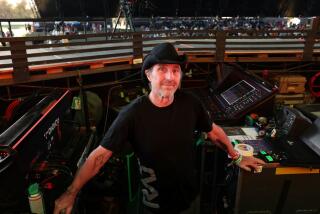BATTLE OVER DIGITAL AUDIOTAPE : Electronics: Although serious audiophiles are snapping up Sony’s new recorders, many would-be buyers are waiting for prices to fall and lawsuits to be settled.
- Share via
After peering at a new Sony digital audiotape recorder and hearing a demonstration tape in the Rogersound Labs store in Torrance, Choong Lee was sold on the superior sound quality of the $950 device. But despite his excitement, Lee didn’t reach for his wallet.
“I’m waiting for it to come down in price a little more before I buy,” said Lee, manager of a video store in Beverly Hills. “Once it gets to $500 or less, it will be worth it.”
Delayed by three years of political and industry wrangling over whether DAT will promote home taping of compact discs, the arrival of Sony-made digital audiotape recorders in stores has attracted throngs of consumers intrigued by publicity about DAT’s ability to offer sound quality akin to compact discs. The controversial new recording format relies on circuits that electronically convert a sound wave into a string of numbers and all but eliminate the distortion found in conventional sound recording.
Despite the improvement in sound, however, Sony’s $950 and $900 digital audiotape machines have drawn a mixed response as many consumers complain about the machines’ high price--even though Sony sells the recorders for almost half the introductory price of its first compact disc players, which were launched in 1983.
There is also concern among consumers about the future of DAT in the wake of the filing of a lawsuit on Monday by the National Music Publishers Assn. against Sony to block the continued sale of DAT recorders.
“Nine hundred and fifty dollars is a lot of money even in 1990 dollars,” said Michael Garrison, owner of the DAT Store in Santa Monica. “Consumers are real smart,” he added. “They saw how prices dropped for the VCR and for the compact disc . . . so they are taking a wait-and-see attitude.”
To be sure, retailers across the country report healthy demand for their small inventory of DAT machines.
Although no nationwide figures are available, Rogersound Labs’ eight stores have sold all but a few demonstration models from their allotment of 29 DAT recorders. The DAT Store has sold its two recorders and a spokesman for Paris Audio said the two stores have sold their allotment but declined to give figures.
“For the most part, we don’t have to do anything,” said Kevin Enderle, a Rogersound Labs salesman. DAT, he said, “basically sells itself.”
Experts believe that most of the early sales have been made to well-heeled audiophiles. The big question, they say, will be whether consumers such as Lee will remain interested in DAT or whether they will be enticed by other technology with more available prerecorded music.
“I go to college, and right now $900 is too much to pay,” said Ed Cruz, a student at El Camino College, who also visited the Torrance store to look at the new DAT recorders. Although Cruz said he’s impressed by DAT, he’s waiting for more manufacturers to offer models and lower prices before buying a machine.
DAT was once hailed as a device that would usher in a new era in audio technology because of its superior sound quality, but sales in the United States had been held up by record companies and songwriters who feared that DAT’s ability to make near-perfect recordings of compact discs would encourage pirating and cut into disc sales.
The recording industry attempted to resolve that issue last summer when an agreement was reached to include a special copy-protection circuit in DAT machines. That circuit, called the serial copy management system, is now included in all DAT machines exported for consumer sale in the United States and Europe.
But last month, songwriter and music publishing groups delayed the passage of legislation that would have mandated the circuit. They argued that the industry proposal was not broad enough to cover other different kinds of digital technology on the horizon. Rather than a copy-protection circuit, composers and publishers want a royalty on each DAT machine or tape sold to compensate them for potential lost sales due to home taping.
The protest has softened crucial record industry support for DAT at some labels.
Bertelsmann Music Group--parent company of the RCA and Arista record labels--said it does not believe that there is a “viable mass market for DAT,” and spokespersons for Capitol and Elektra have indicated that they are similarly pessimistic about the technology. (Sony Classical is the only record label that currently offers prerecorded DAT tapes.)
Yet Sony--also the only manufacturer so far to offer digital audiotape recorders in the United States, forecasts that about 75,000 DAT machines will be sold in the first 12 months by all DAT manufacturers. That’s more than double the 35,000 CD players sold in their introductory year.
“We feel there has been a pretty strong demand for DAT,” said Martin Homlish, president of audio component systems for Sony Corp. of America. “I don’t think (the high introductory price) is really going to be a problem at all. Only a year ago, the industry was quoting (introductory) prices of $1,500. I think consumers are pleasantly surprised.”
Harold Himes, a Hermosa Beach computer consultant, is one of those.
“I’ve been waiting a long time for DAT to come along because I wanted to get out of the cassette technology,” said Himes, who describes himself as an audiophile.
Himes, who recently purchased a $950 Sony DAT home recorder as well as a $1,750 Kenwood DAT player for his car, said he was not deterred by DAT’s high price: “I have disposable income, so it’s no big deal to me. I’ve been through it all--eight-track (tape players), LPs, cassettes, CDs and now this. I welcome improvements in technology.”






